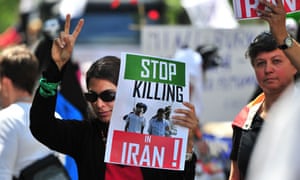Mohammad Javad Larijani was responding to a UN report expressing concerns about persecution of Iran's gay community
Thu 14 Mar 2013 17.10 GMTFirst published on Thu 14 Mar 2013 17.10 GMT
Shares
31
Comments
45

An Iranian official whose job is to protect human rights has described homosexuality as an illness, after a UN special rapporteur expressed concerns about the systematic persecution of Iran's gay, lesbian, bisexual and transgender community.
"In our society, homosexuality is regarded as an illness and malady," said Mohammad Javad Larijani, secretary general of Iran's high council for human rights, a judicial body in charge of defending the Islamic republic against allegations of rights abuse.
Larijani made his remarks on state television in Tehran after Ahmed Shaheed, a former foreign affairs minister of the Maldives who is tasked by the UN with investigating Iran's human rights record, published his latest report which warned of widespread and systematic violations in the country.
"Promoting homosexuality is illegal and we have strong laws against it," Larijani said, according to the conservative news website Khabaronline. "We consider homosexuality an illness that should be cured. We don't consider it acceptable to beat or mistreat homosexuals, either."
However, homosexuality is punishable by death in Iran, according to fatwas issued by almost all Iranian clerics. Iran is recorded as having executed people convicted of sodomy.
"Articles 232-233 of the new penal code would mandate a death sentence for the 'passive' male involved in sodomy, regardless of whether his role was consensual," the rapporteur wrote in his latest findings.
"Under the new law, 'active' Muslim and unmarried males may be subject to 100 lashes so long as they are not engaged in rape." Married and/or non-Muslim males may be put to death for the same act, the report said. "Men involved in non-penetrative same-sex acts or women engaged in same-sex acts would also face 100 lashes according to the new penal code," Shaheed wrote.
Larijani said: "It [homosexuality] is considered as a norm in the west and they are forcing us to accept it. We are strongly against this."
Homosexuality was de-listed by the World Health Organisation as a classification of diseases and related health problems in 1990.
Around 76 countries in the world still ban homosexuality, including 46 Commonwealth countries which criminalise homosexuality, based on laws imposed by Britain during the colonial era.
Ayatollah Abdollah Javadi-Amoli, an influential Iranian cleric, said in a speech last April that homosexuals were inferior to dogs and pigs and blamed them for spread of Aids.
President Mahmoud Ahmadinejad famously said in New York: "In Iran, we don't have homosexuals like you do in your country. This does not exist in our country."
Iranian journalist Siamak Ghaderi, who interviewed a number of Iranian homosexuals in response to Ahmadinejad's speech, is in jail after being sentenced to four years and 60 lashes on charges of "propagating against the regime" and "creating public anxiety".
Earlier this week, Shaheed presented his fourth report to the UN in Geneva, which highlights many cases in Iran of torture, executions, illegal arrests of journalists and denial of basic rights to religious, ethnic and sexual minorities.
The report led to much criticism from Tehran. Iran's foreign ministry spokesman, Ramin Mehmanparast, said it was unsubstantiated and Larijani accused Shaheed of receiving bribes from the US.
"The money the special rapporteur has received from the US State Department has led to a situation that he cannot write about anything except their anti-Iran desires," Larijani was quoted as saying.
"This behaviour and work of the special rapporteur in no way meets the minimum standards of fairness and impartiality," he told the Geneva forum. "The rapporteur has reduced himself to a political opponent acting against the Islamic Republic of Iran."
Since we published our environmental pledge…
… focused on the escalating climate crisis, Guardian readers from more than 100 countries across the world have supported us – thank you. Many of you have told us how much you value our commitment: to be truthful, resolute and undeterred in pursuing this important journalism. We are galvanised by your generous support as it makes our work possible.
The Guardian made a choice: to keep our journalism open to all. We do not have a paywall because we believe everyone deserves access to factual information, regardless of where they live or what they can afford.
We will not stay quiet on the escalating climate crisis and we recognise it as the defining issue of our lifetimes. The Guardian will give global heating, wildlife extinction and pollution the urgent attention they demand. Our independence means we can interrogate inaction by those in power. It means Guardian reporting will always be driven by scientific facts, never by commercial or political interests.
We believe that the problems we face on the climate crisis are systemic and that fundamental societal change is needed. We will keep reporting on the efforts of individuals and communities around the world who are fearlessly taking a stand for future generations and the preservation of human life on earth. We want their stories to inspire hope. We will also report back on our own progress as an organisation, as we take important steps to address our impact on the environment.
No comments:
Post a Comment